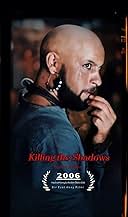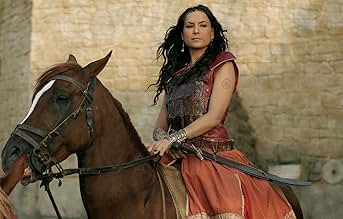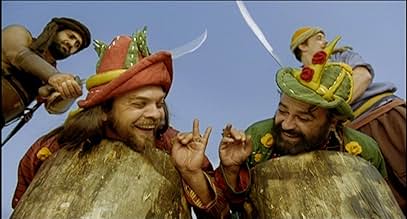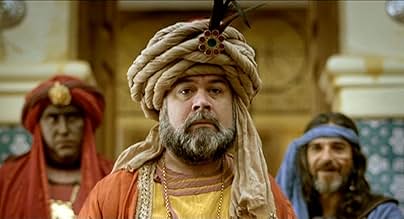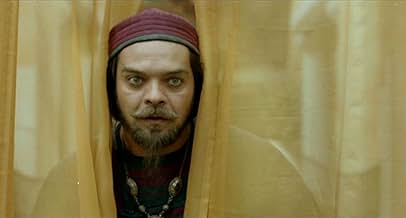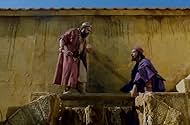IMDb-BEWERTUNG
7,5/10
13.933
IHRE BEWERTUNG
Eine Geschichte über die Tragödie und die Gefahr des Humors und den Humoristen - Eine Komödie so groß wie die Länder Roms.Eine Geschichte über die Tragödie und die Gefahr des Humors und den Humoristen - Eine Komödie so groß wie die Länder Roms.Eine Geschichte über die Tragödie und die Gefahr des Humors und den Humoristen - Eine Komödie so groß wie die Länder Roms.
- Auszeichnungen
- 9 Gewinne & 7 Nominierungen insgesamt
Aysen Gruda
- Ana
- (as Ayşen Guruda)
Empfohlene Bewertungen
I watched this movie during the Copenhagen film festival, and thought I was going to see an ethnically different movie with poor actor, poor instruction and poor special effects, if any. I have never been more wrong regarding expectations when entering a movie theater.
I watched a fascinating story with good acting performances, that had a fascinating and important story to tell, which was as valid in the 13th century as it is today. Besides picturing philosophical topics, it has and "underplayed" humor regarding how humans use religion. By far the best movie I have seen this year. The only downside to the movie is that it is too long - on the other hand, this provides time to think about the plot and the points the movie is making.
I watched a fascinating story with good acting performances, that had a fascinating and important story to tell, which was as valid in the 13th century as it is today. Besides picturing philosophical topics, it has and "underplayed" humor regarding how humans use religion. By far the best movie I have seen this year. The only downside to the movie is that it is too long - on the other hand, this provides time to think about the plot and the points the movie is making.
10punery2
With its plot, actors, and artistic direction, there is no doubt that this movie is the best of Turkish cinema. The historical background is well studied, surveyed and depicted with a whimsical style. A true expression of the 13th Century Anatolia with its turmoil in the region is illustrated with fantastic humor and warm acting.
Although the movie does not claim to be a pure comedy, with its wit, satire, and critical humor, it is also one of the best Turkish comedies.
The most powerful part of the movie are the dialogs between the main characters "Hacivat" and "Karagoz" who are now the lead characters of Turkish traditional shadow play. Their lives unknown, they are remembered to be two contrasting characters, one of which coming from the educated class, and the other from the nomadic illiterate tribes.
Despite its historical setting, the story is still valid today considering the political setting in the world and freedom of speech.
Although the movie does not claim to be a pure comedy, with its wit, satire, and critical humor, it is also one of the best Turkish comedies.
The most powerful part of the movie are the dialogs between the main characters "Hacivat" and "Karagoz" who are now the lead characters of Turkish traditional shadow play. Their lives unknown, they are remembered to be two contrasting characters, one of which coming from the educated class, and the other from the nomadic illiterate tribes.
Despite its historical setting, the story is still valid today considering the political setting in the world and freedom of speech.
"Karagoz Hacivat Neden Olduruldu" is Akay and Kazak's take of the legendary personalities Karagoz and Hacivat who are the main characters of Turkish shadow theater. Although their life stories are not known, Akay and Kazak tell a very plausible story that could easily be true. True or not, their story fits exactly what they symbolize - the synthesis of crude and sophisticated humor freely targeting dishonesty, corruption, unfairness and inequality in society.
The setting is the early 14th century, when Byzantian and Seljuk Empires were in shambles following the destructive Mongolian invasion. At the Muslim/Christian borderlands, and out of the reach of the now weakening Mongolian power, the Ottoman State is at its infancy, rapidly expanding at the expense of the neighboring Byzantian and Turkish principalities. Since the cultural homogenization is not as fast as military conquests, a colorful, eclectic intermixing of cultures is underway. This is the perfect breeding ground for the elements Akay seems to take his inspirations from, and he weaves them into his story so masterfully.
Ezel Akay seems to reach his maturity at a very early stage. With his second movie, he already has a signature style and an efficient formula to make the audience laugh and cry with only a snap of a finger. He has absolute emotional control over the audience, thanks to his masterful use of visuals and music.
He also owes a lot to Haluk Bilginer (Karagoz), who is an acting genius. (His talents seem to include Mongolian throat singing if my ears did not deceive me). Beyazit Öztürk (Hacivat) is not as talented an actor, but he is the wisest choice for the role. Another good casting is Güven Kirac as the villain. He has such a wide acting range, he gave me the impression that he could have played almost all the roles in the movie.
Like Akay's earlier movie 'Neredesin Firuze', the music is outstanding - Central Asian Turko-Mongolian tunes yet to be "contaminated" by Middle Eastern influences, beginning to clash with already eclectic Eastern Roman-Judaic melodies. The dynamic synthetic nature of the music parallels with the cultural synthesis what early Ottoman state and society building is all about.
The setting is the early 14th century, when Byzantian and Seljuk Empires were in shambles following the destructive Mongolian invasion. At the Muslim/Christian borderlands, and out of the reach of the now weakening Mongolian power, the Ottoman State is at its infancy, rapidly expanding at the expense of the neighboring Byzantian and Turkish principalities. Since the cultural homogenization is not as fast as military conquests, a colorful, eclectic intermixing of cultures is underway. This is the perfect breeding ground for the elements Akay seems to take his inspirations from, and he weaves them into his story so masterfully.
Ezel Akay seems to reach his maturity at a very early stage. With his second movie, he already has a signature style and an efficient formula to make the audience laugh and cry with only a snap of a finger. He has absolute emotional control over the audience, thanks to his masterful use of visuals and music.
He also owes a lot to Haluk Bilginer (Karagoz), who is an acting genius. (His talents seem to include Mongolian throat singing if my ears did not deceive me). Beyazit Öztürk (Hacivat) is not as talented an actor, but he is the wisest choice for the role. Another good casting is Güven Kirac as the villain. He has such a wide acting range, he gave me the impression that he could have played almost all the roles in the movie.
Like Akay's earlier movie 'Neredesin Firuze', the music is outstanding - Central Asian Turko-Mongolian tunes yet to be "contaminated" by Middle Eastern influences, beginning to clash with already eclectic Eastern Roman-Judaic melodies. The dynamic synthetic nature of the music parallels with the cultural synthesis what early Ottoman state and society building is all about.
Thats really magnificent movie, still i am listening movies soundtrack whenever i miss my history. I usually watch movie just once if its beautiful 2-3 th times but hacivat karagoz totally out of my league 8 or 9 times I already watched. İn the beginning I watched with my all guest you know as a Turkish people we like to go to family friends and my every guest watched this movie. Details effect me to much with a lovely soundtracks and they are really well prepared after the 3 th times you are focusing the details and every details was perfect. Movie's smells like historical taste like instructive and totally comic movie just watch...
Wusstest du schon
- WissenswertesKirakosyan used the fire as key light at night scenes.
- SoundtracksDört Kitabin Manasi
(The Meaning of Four Books)
Performed by Haluk Bilginer & Sebnem Dönmez
Music composed by Ender Akay
Top-Auswahl
Melde dich zum Bewerten an und greife auf die Watchlist für personalisierte Empfehlungen zu.
- How long is Killing the Shadows?Powered by Alexa
Details
- Erscheinungsdatum
- Herkunftsland
- Offizieller Standort
- Sprache
- Auch bekannt als
- Killing the Shadows
- Drehorte
- Produktionsfirma
- Weitere beteiligte Unternehmen bei IMDbPro anzeigen
Box Office
- Budget
- 3.500.000 $ (geschätzt)
- Weltweiter Bruttoertrag
- 3.004.541 $
- Laufzeit2 Stunden 15 Minuten
- Farbe
- Sound-Mix
- Seitenverhältnis
- 1.85 : 1
Zu dieser Seite beitragen
Bearbeitung vorschlagen oder fehlenden Inhalt hinzufügen

Oberste Lücke
By what name was Hinrichtung der Schatten (2006) officially released in Canada in English?
Antwort
